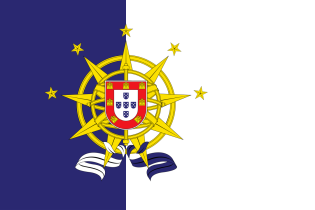Portuguese National Federation: Difference between revisions
(Page created.) |
mNo edit summary |
||
| Line 14: | Line 14: | ||
11 April 1933|independence-title=Establishment}} | 11 April 1933|independence-title=Establishment}} | ||
'''Portugal''', officially the '''Portuguese Federation''', is a [[Legacy Nation]]. It is a [[Regional Power]], a member of the [[League of Nations]], and a member of the [[Axis Powers]]. | '''Portugal''', officially the '''Portuguese National Federation''', is a [[Legacy Nation]]. It is a [[Regional Power]], a member of the [[League of Nations]], and a member of the [[Axis Powers]]. | ||
== History == | == History == | ||
Revision as of 06:46, 24 May 2025
Portugal, officially the Portuguese National Federation, is a Legacy Nation. It is a Regional Power, a member of the League of Nations, and a member of the Axis Powers.
History
Pre-First Scinfaxi War
The earliest signs of settlement of what would become Portugal on Earth dates to around 5500 BCE. Celtic and Iberian peoples arrived in the first millennium BCE. The region came under Roman invasion in the second century BCE, followed by a succession of migratory peoples from the fifth to eighth centuries CE. The Umayyad Caliphate controlled much of what would later become Portugal from the eighth to the eleventh centuries, but were gradually expelled during the Reconquista, culminating with the capture of the Algarve in 1249. Portugal began taking shape during this period, initially as a county of the Kingdom of León in 868 CE and recognized as a kingdom with Manifestis Probatum in 1179.
One of the earliest participants in the Age of Discovery, Portugal made several discoveries in nautical science that better enabled safe round-trip voyages and deep-sea travel. Portugal established itself as a major economic and political power with a maritime empire that extended along the South Atlantic and Indian oceans. The Portuguese were among the first Europeans to explore and discover new territories and sea routes, establishing a global commercial network of settlements, colonies, and trading posts. A dynastic crisis in the early 1580s resulted in the Iberian Union (1580–1640), which unified Portugal under Spanish rule, marking its gradual decline as a global power. Portuguese sovereignty was regained in 1640, followed by a costly and protracted war lasting until 1688. The Napoleonic Wars drove the relocation of the Portuguese court to Brazil in 1807, leading to its elevation from colony to kingdom - culminating with Brazilian independence in 1822. The independence of Brazil triggered a Portuguese civil war (1828–1834) between supporters for a constitutional monarchy and absolutist monarchists. The Portuguese monarchy endured until the 5 October 1910 revolution, when it was replaced with a republic. A phase of unrest ultimately led to the republic's replacement with the authoritarian Ditadura Nacional, which then turned into the Estado Novo in 1933.
